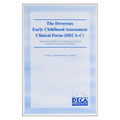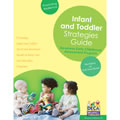The Devereux Student Strengths Assessment (DESSA) is a 72-item, standardized, norm-referenced behavior rating scale that assesses the social-emotional competencies that serve as protective factors for children in kindergarten through the eighth grade. Standard scores can be used to calibrate each child's competence in each of the eight dimensions and guide school/program-wide, classwide, and individual strategies to promote those competencies. Nationally normed on 2,500 children, the DESSA continues the tradition of meaningful, practical and empirically sound evaluation of children's strengths established by the Devereux Early Childhood Assessment. Standardization sample (n=2,500) reflects the diversity of children today.
An Introduction to the DESSA
Sample Classroom Profile
Paul LeBuffe
 Paul LeBuffe, M.A., is the Co-Director of the Devereux Center for Resilient Children in Villanova, Pennsylvania. He is a graduate of St. Mary's College of Maryland and received his Master's degree in experimental psychology from Bryn Mawr College. Paul is an author of many widely-used assessments of behaviors related to children's social-emotional strengths and needs including the Devereux Behavior Rating Scale - School Form, the Devereux Scales of Mental Disorders (DSMD), the Devereux Early Childhood Assessment (DECA), the Devereux Early Childhood Assessment Clinical Form (DECA-C) the Devereux Early Childhood Assessment - Infant/Toddler Form (DECA-I/T) and most recently, the Devereux Student Strengths Assessment (DESSA.) His major research interests are the measurement and promotion of social-emotional competence and resilience in children, psychometrics and test development, treatment outcome evaluation in behavioral healthcare, and suicide prevention education.
Paul LeBuffe, M.A., is the Co-Director of the Devereux Center for Resilient Children in Villanova, Pennsylvania. He is a graduate of St. Mary's College of Maryland and received his Master's degree in experimental psychology from Bryn Mawr College. Paul is an author of many widely-used assessments of behaviors related to children's social-emotional strengths and needs including the Devereux Behavior Rating Scale - School Form, the Devereux Scales of Mental Disorders (DSMD), the Devereux Early Childhood Assessment (DECA), the Devereux Early Childhood Assessment Clinical Form (DECA-C) the Devereux Early Childhood Assessment - Infant/Toddler Form (DECA-I/T) and most recently, the Devereux Student Strengths Assessment (DESSA.) His major research interests are the measurement and promotion of social-emotional competence and resilience in children, psychometrics and test development, treatment outcome evaluation in behavioral healthcare, and suicide prevention education.
Jack Naglieri
 Dr. Jack A. Naglieri is Professor of Psychology at George Mason University in Fairfax, VA . Prior to his current position he was Professor of School Psychology and Psychology at the Ohio State University where he taught from 1982 to 2000. He also is a Fellow of American Psychological Association (APA) Division 16, recipient of American Psychological Association Division 16 2001 Senior Scientist Award, and holds an appointment as a senior Research Scientist at the Devereux Foundation's Institute for Clinical Training and Research (ICTR).
Dr. Jack A. Naglieri is Professor of Psychology at George Mason University in Fairfax, VA . Prior to his current position he was Professor of School Psychology and Psychology at the Ohio State University where he taught from 1982 to 2000. He also is a Fellow of American Psychological Association (APA) Division 16, recipient of American Psychological Association Division 16 2001 Senior Scientist Award, and holds an appointment as a senior Research Scientist at the Devereux Foundation's Institute for Clinical Training and Research (ICTR).
Dr. Naglieri obtained his Bachelor's degree in Psychology from Long Island University, Master of Science from St. John's University, and Ph.D. in Educational Psychology from the University of Georgia in 1979. He worked as a school psychologist in the New York area from 1974-1977. The author of more than 150 scholarly papers, chapters, books, and tests, he has focused his efforts since the late 1970s on re-conceptualizing intelligence.
Jack A. Naglieri is the co-author of the Devereux Early Childhood Assessment (DECA) and the Devereux Early Childhood Assessment Clinical Form (DECA-C). He is also the author of the Cognitive Assessment System (Naglieri & Das, 1997), the CAS Scoring Aide (Naglieri, 2002), the General Ability Measure for Adults (Naglieri & Bardos, 1997), Naglieri Nonverbal Ability Test (Naglieri, 1996), Devereux Scoring Assistant (LeBuffe, Naglieri, & Pfeiffer, 1996), Devereux Scales of Mental Disorders (Naglieri, LeBuffe, & Pfeiffer, 1994), Devereux Behavior Rating Scales School Form (Naglieri, LeBuffe, & Pfeiffer, 1994), Draw A Person: Screening Procedure for Emotional Disturbance (Naglieri, McNeish, & Bardos, 1990), Draw A Person: Quantitative Scoring System (Naglieri, 1988), Matrix Analogies Test (Naglieri, 1985).
Valerie Shapiro
 Valerie B. Shapiro, L.S.W. is a Program Development and Intervention Specialist at the Devereux Center for Resilient Children. She earned her BA in Psychology from Colgate University and her MSS from the Bryn Mawr Graduate School of Social Work & Social Research. A licensed social worker and DOE certified school social worker, Valerie has worked in diverse settings providing school-based prevention programming, community-based outpatient psychological services and residential clinical interventions. Valerie is pursuing her doctorate at the University of Washington Department of Social Welfare working with the Social Development Research Group. Valerie also serves as the Coordinator for the National Association of School Psychologists' Special Interest Group for Social-Emotional Learning.
Valerie B. Shapiro, L.S.W. is a Program Development and Intervention Specialist at the Devereux Center for Resilient Children. She earned her BA in Psychology from Colgate University and her MSS from the Bryn Mawr Graduate School of Social Work & Social Research. A licensed social worker and DOE certified school social worker, Valerie has worked in diverse settings providing school-based prevention programming, community-based outpatient psychological services and residential clinical interventions. Valerie is pursuing her doctorate at the University of Washington Department of Social Welfare working with the Social Development Research Group. Valerie also serves as the Coordinator for the National Association of School Psychologists' Special Interest Group for Social-Emotional Learning.

 Paul LeBuffe, M.A., is the Co-Director of the Devereux Center for Resilient Children in Villanova, Pennsylvania. He is a graduate of St. Mary's College of Maryland and received his Master's degree in experimental psychology from Bryn Mawr College. Paul is an author of many widely-used assessments of behaviors related to children's social-emotional strengths and needs including the Devereux Behavior Rating Scale - School Form, the Devereux Scales of Mental Disorders (DSMD), the Devereux Early Childhood Assessment (DECA), the Devereux Early Childhood Assessment Clinical Form (DECA-C) the Devereux Early Childhood Assessment - Infant/Toddler Form (DECA-I/T) and most recently, the Devereux Student Strengths Assessment (DESSA.) His major research interests are the measurement and promotion of social-emotional competence and resilience in children, psychometrics and test development, treatment outcome evaluation in behavioral healthcare, and suicide prevention education.
Paul LeBuffe, M.A., is the Co-Director of the Devereux Center for Resilient Children in Villanova, Pennsylvania. He is a graduate of St. Mary's College of Maryland and received his Master's degree in experimental psychology from Bryn Mawr College. Paul is an author of many widely-used assessments of behaviors related to children's social-emotional strengths and needs including the Devereux Behavior Rating Scale - School Form, the Devereux Scales of Mental Disorders (DSMD), the Devereux Early Childhood Assessment (DECA), the Devereux Early Childhood Assessment Clinical Form (DECA-C) the Devereux Early Childhood Assessment - Infant/Toddler Form (DECA-I/T) and most recently, the Devereux Student Strengths Assessment (DESSA.) His major research interests are the measurement and promotion of social-emotional competence and resilience in children, psychometrics and test development, treatment outcome evaluation in behavioral healthcare, and suicide prevention education. Dr. Jack A. Naglieri is Professor of Psychology at George Mason University in Fairfax, VA . Prior to his current position he was Professor of School Psychology and Psychology at the Ohio State University where he taught from 1982 to 2000. He also is a Fellow of American Psychological Association (APA) Division 16, recipient of American Psychological Association Division 16 2001 Senior Scientist Award, and holds an appointment as a senior Research Scientist at the Devereux Foundation's Institute for Clinical Training and Research (ICTR).
Dr. Jack A. Naglieri is Professor of Psychology at George Mason University in Fairfax, VA . Prior to his current position he was Professor of School Psychology and Psychology at the Ohio State University where he taught from 1982 to 2000. He also is a Fellow of American Psychological Association (APA) Division 16, recipient of American Psychological Association Division 16 2001 Senior Scientist Award, and holds an appointment as a senior Research Scientist at the Devereux Foundation's Institute for Clinical Training and Research (ICTR). Valerie B. Shapiro, L.S.W. is a Program Development and Intervention Specialist at the Devereux Center for Resilient Children. She earned her BA in Psychology from Colgate University and her MSS from the Bryn Mawr Graduate School of Social Work & Social Research. A licensed social worker and DOE certified school social worker, Valerie has worked in diverse settings providing school-based prevention programming, community-based outpatient psychological services and residential clinical interventions. Valerie is pursuing her doctorate at the University of Washington Department of Social Welfare working with the Social Development Research Group. Valerie also serves as the Coordinator for the National Association of School Psychologists' Special Interest Group for Social-Emotional Learning.
Valerie B. Shapiro, L.S.W. is a Program Development and Intervention Specialist at the Devereux Center for Resilient Children. She earned her BA in Psychology from Colgate University and her MSS from the Bryn Mawr Graduate School of Social Work & Social Research. A licensed social worker and DOE certified school social worker, Valerie has worked in diverse settings providing school-based prevention programming, community-based outpatient psychological services and residential clinical interventions. Valerie is pursuing her doctorate at the University of Washington Department of Social Welfare working with the Social Development Research Group. Valerie also serves as the Coordinator for the National Association of School Psychologists' Special Interest Group for Social-Emotional Learning.






